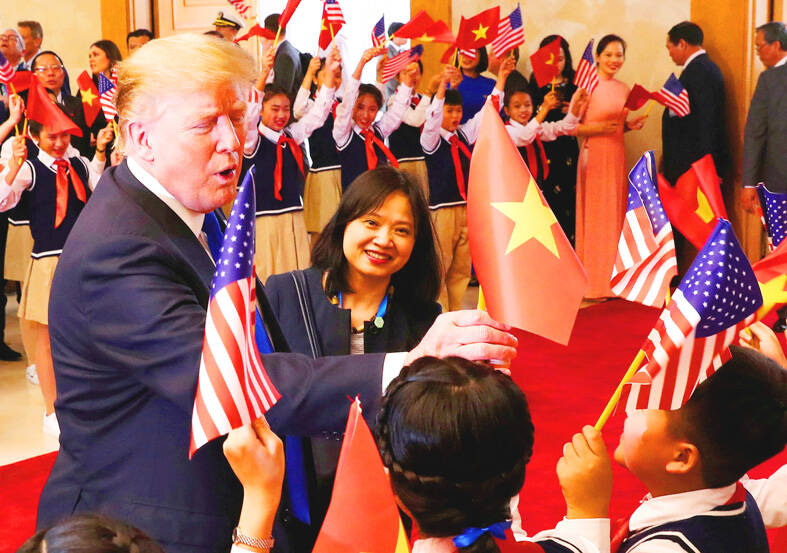Vietnamese and US companies have signed more than US$4 billion in deals, a petrochemical giant said yesterday, as anxiety mounts in Hanoi over potential tariffs under the administration of US President Donald Trump.
The Southeast Asian nation has the third-biggest trade surplus with the US, after China and Mexico — both targeted by Trump since he took office.
A statement posted by PetroVietnam Power Corp (PVPower) on its Web site said the new projects — in areas such as aviation, oil and gas exploration, and petrochemical imports — were worth about US$4.15 billion.

Photo: Reuters
The “highly meaningful” deals were aimed at establishing “balanced and harmonious” trade, and would create hundreds of thousands of jobs for workers in the two nations, PVPower said.
They were signed in the US on Thursday during a visit by Vietnamese Minister of Industry and Trade Nguyen Hong Dien to meet US Trade Representative Jamieson Greer in Washington.
Greer told Dien that Vietnam “needs to have stronger solutions to open the market and improve the trade balance,” according to a report on the Web site of the Vietnamese Ministry of Industry and Trade.
There is increasing worry in Hanoi that Vietnam could be the next target of Trump’s tariffs, which have sent shock waves through global markets.
Earlier, Hanoi said it was reviewing import duties on goods from the US. Vietnamese Prime Minister Pham Minh Chinh told US Ambassador Marc Knapper that the review would look to encourage increased imports of liquified natural gas, as well as agricultural and high-tech products, a report on the government’s Web site said on Thursday.
Chinh told Knapper that Vietnam was “actively addressing the current concerns of the US in economic-trade-investment relations.”
Vietnam was also “reviewing import tariffs on goods from the United States, encouraging increased imports of key US products that Vietnam needs, especially agricultural products, liquefied gas and high-tech products,” the report said.
The US trade deficit in goods with Vietnam was US$123.5 billion last year, up more than 18 percent on 2023, according to the Office of the US Trade Representative.

In Italy’s storied gold-making hubs, jewelers are reworking their designs to trim gold content as they race to blunt the effect of record prices and appeal to shoppers watching their budgets. Gold prices hit a record high on Thursday, surging near US$5,600 an ounce, more than double a year ago as geopolitical concerns and jitters over trade pushed investors toward the safe-haven asset. The rally is putting undue pressure on small artisans as they face mounting demands from customers, including international brands, to produce cheaper items, from signature pieces to wedding rings, according to interviews with four independent jewelers in Italy’s main

Japanese Prime Minister Sanae Takaichi has talked up the benefits of a weaker yen in a campaign speech, adopting a tone at odds with her finance ministry, which has refused to rule out any options to counter excessive foreign exchange volatility. Takaichi later softened her stance, saying she did not have a preference for the yen’s direction. “People say the weak yen is bad right now, but for export industries, it’s a major opportunity,” Takaichi said on Saturday at a rally for Liberal Democratic Party candidate Daishiro Yamagiwa in Kanagawa Prefecture ahead of a snap election on Sunday. “Whether it’s selling food or

CONCERNS: Tech companies investing in AI businesses that purchase their products have raised questions among investors that they are artificially propping up demand Nvidia Corp chief executive officer Jensen Huang (黃仁勳) on Saturday said that the company would be participating in OpenAI’s latest funding round, describing it as potentially “the largest investment we’ve ever made.” “We will invest a great deal of money,” Huang told reporters while visiting Taipei. “I believe in OpenAI. The work that they do is incredible. They’re one of the most consequential companies of our time.” Huang did not say exactly how much Nvidia might contribute, but described the investment as “huge.” “Let Sam announce how much he’s going to raise — it’s for him to decide,” Huang said, referring to OpenAI

The global server market is expected to grow 12.8 percent annually this year, with artificial intelligence (AI) servers projected to account for 16.5 percent, driven by continued investment in AI infrastructure by major cloud service providers (CSPs), market researcher TrendForce Corp (集邦科技) said yesterday. Global AI server shipments this year are expected to increase 28 percent year-on-year to more than 2.7 million units, driven by sustained demand from CSPs and government sovereign cloud projects, TrendForce analyst Frank Kung (龔明德) told the Taipei Times. Demand for GPU-based AI servers, including Nvidia Corp’s GB and Vera Rubin rack systems, is expected to remain high,